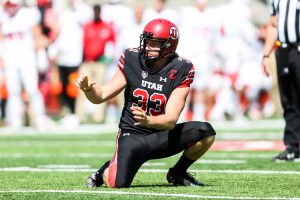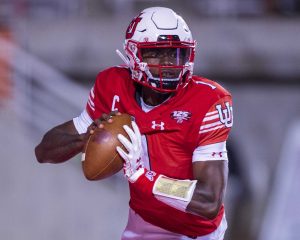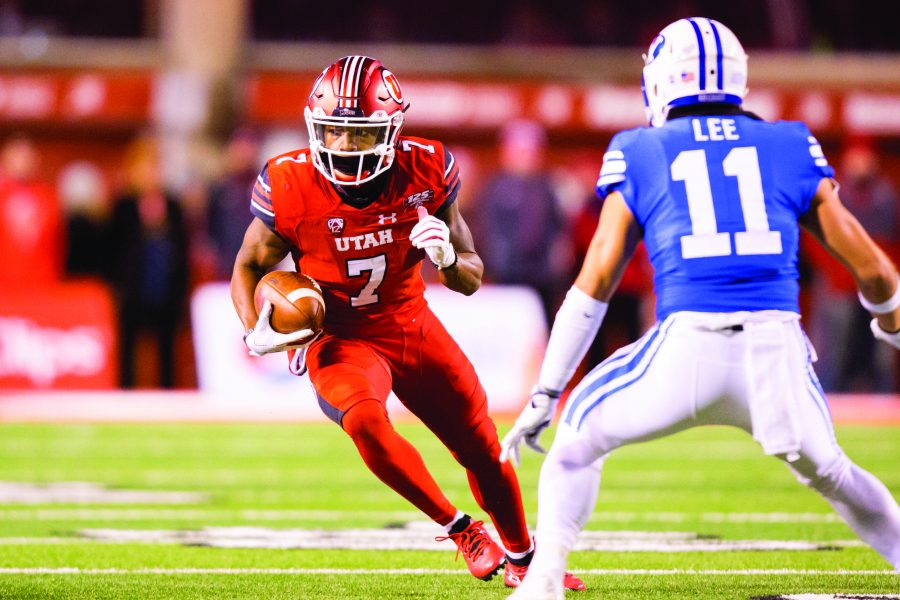While the world and life of a collegiate athlete may provide the base for a professional career and riches beyond one’s wildest dreams, an overwhelming number of student athletes do not find jobs in professional sports out of college. Because of this, it is the responsibility of the university they belong to to provide them with the resources to find work once the cleats are hung up, and that is exactly what the goal is at the University of Utah. With hundreds of student athletes spread throughout the campus, the U has prided itself on its ability to provide these athletes with a sound, fundamental education, just as they do for the rest of their student body.
This year in particular has been a historic year for the Utes in athletics. The U has had a record number of athletes selected to the renowned Pac-12 All-Academic teams on top of historic seasons from some of the U’s top teams.
Football, one of the university’s cornerstone athletics programs, has a longstanding history of success in academics. Just this past year, six Utah football players were named to the All-Academic Teams, including sophomore wide receiver Britain Covey, making the team in his first year back from a two-year mission in Chile as a member of The Church of Jesus Christ of Latter-day Saints. He joins five other Utes who found spots on the All-Academic Team, including Nick Heninger, Jaylon Johnson, Terrell Burgess, Mitch Wishnowsky and Connor Haller, all of whom made appearances on the field last season.
That’s not to mention the handful of Utah football players who received honorable mentions on the academics list, including standout safety Marquis Blair, offensive lineman Jordan Agasiva, both Tyler Huntley and Jason Shelley, Jake Jackson, Demari Simpkins, Nick Ford, Javelin Guidry, Josh Nurse, John Penisini, Mike Tafua, Darrin Paulo, Hauati Pututau and Mason Woodward.
All of the players mentioned met the requirements to be considered for the team, which are that the player maintains above a 3.0 grade-point average and appear in more than half of the team’s games. This means that they had to balance keeping their bodies in playing shape while keeping their studies up in classes, something that the academic support programs, largely headed by Cyrus Satoafaiga, who serves as the team’s academic coordinator.

(Photo by Curtis Lin/ Daily Utah Chronicle)
Above all else in his job requirements, Satoafaiga’s main role is to support the athletes he oversees and provide them with the necessary resources to succeed.
“I’ve been here for a few years now,” Satoafaiga said. “Since I’ve come on board, I’ve just tried to establish a culture of academics that can compete with some of the other top schools in the Pac-12.”
The U, being in the Pac-12 with other academic powerhouses like Stanford, USC and UCLA, have a lot to live up to in the way of success in both athletics and academics. Satoafaiga’s system — one that he’d developed over several years with previous institutions — applies a blanket approach that still caters to the needs of each athlete on the team.
“We have a heavy amount of communication between the departments at the U,” Satoafaiga said. “All of these play into the program that we offer our student athletes and give them a way to succeed.”
Satoafaiga gave a lot of credit to the other members of Utah football for helping him to achieve this system of excellence. Head coach Kyle Whittingham and Academic Advisor Cassidy Blaine have been key factors during his time with the university.
The academic success of the university’s athletic teams does not stop at the football field. Every team at the U has representatives in the Pac-12 All-Academic Teams. Of the 30 members of the Women’s Swimming and Diving teams, 19 made the All-Academic Teams with Utah-native Marah Smith making the First Team for the second year in a row. She’s joined by sophomore swimming sensation Samantha Kraus, who qualified in her first year with the team since transferring from Indiana University.
One of the biggest reasons for the Utes’ success in the classroom is the dedicated staff that help them in their studies. Currently, the university employs nine education professionals with the sole job of ensuring academic success for all Utah athletes. Although the coaches of Utah’s teams are often heavily involved with the academic processes, this team takes on a majority of the work in academic regulation. Leading the charge is the director of academics, Mary Chris Finnigan. Aside from many other duties on behalf of the students, Finnigan’s job is to be a guiding voice to the hundreds of athletes that walk the roads of the U.
“I oversee the academic advisors and the academic programs,” Finnigan said. “Both myself and Ashley [Lear] oversee the tutor program, as well as the learning specialist program.”
Lear serves the athletics department as the director of personal development, as well as heading the student services department. Her priority with the tutoring program is to pair student athletes with course-specific tutors, which can prove to be critical in the academic development of any student, but even more so with student athletes, who have to juggle practice and physical progress with their responsibilities in the classroom.
When it comes to educating athletes, each and every person learns in their own way. Because of this, the academic department has invested much time and resources into the best possible ways to ensure academic success, and each department has its own methods of promoting achievement in the classroom.
“We have implemented a standardized criteria for all incoming and returning student athletes to determine the level of support needed,” Lear said. “At the beginning of each semester, all student athletes are assessed and assigned one of the three levels of support — learning specialist, advisor and independent.”
These three tiers of support offer different things for student athletes. The learning specialist, being the highest level of support, provides athletes with a dedicated member of the educational staff, who helps them in most facets of their studies. The advisor level acts in more of an assistant-like role, and the independent level gives student athletes the most freedom to achieve their educational goals. “Additionally,” Lear said, “most teams participate in team study hall, in addition to meeting weekly study hall requirements, which require them to participate in a certain number of study hours in our academic center.”

The study hall is a pivotal part of educational advancement within Utah athletics, and every team has their requirements regarding its weekly use.
“There’s a level of communication between all parts of the football team,” Satoafaiga said. “We know where the athletes are most of the time, so if we have an athlete telling us he couldn’t make class or study room because he was in conditioning, we know he wasn’t telling the truth.”
The study hall time is also a great way to help those athletes that underperform in their academic duties. Because these learning specialists are so tuned in to each of the students’ classes and workloads, it’s easy to see if an athlete misses an assignment, does poorly on an exam or essay and other academic shortcomings.
“Should a student athlete be underperforming, that level of support may be adjusted,” Lear said. “ Additionally, coaches have the autonomy to require additional academic time (i.e. additional study hours) for a student athlete, if needed.”
Of course, the athletes at the U need to meet an academic “minimum” to be able to participate in Utah sports. This usually involves progressing towards a degree and meeting a grade-point average target.
“Academic eligibility for athletes,” Finnigan said, “is usually determined by requirements and criteria set by the NCAA, which is basically the same for each sport.”
Every member of the academic team had a similar response when asked about the relationship between success in the classroom and success on the field — that the developing of habits and strong work ethic gives student athletes the best possible chance to bridge the gap between off and on-field activities.
“We believe that all responsibilities that a student athlete has are related,” Finnigan said. “Students that are committed to excellence will work hard in the classroom and the weight room. They will take care of their bodies with appropriate nutrition, sleep and weight training, and they will push themselves to be the best in their sport.”
“We think the same skill set and habits — hard work, punctuality and accountability — apply to student athlete success both on and off the field,” Lear also said.
While academics can be an alternate thought to most when they attend their favorite Utah sporting event, it is vital to keep in mind that everyone on the field — coaches included — plays a part in the academic success that makes the U one of the most prestigious learning and athletic institutions in not only the Pac-12, but in the nation.


